Media
Harry and Meghan: What's the media's 'invisible contract' with British royalty? – BBC News
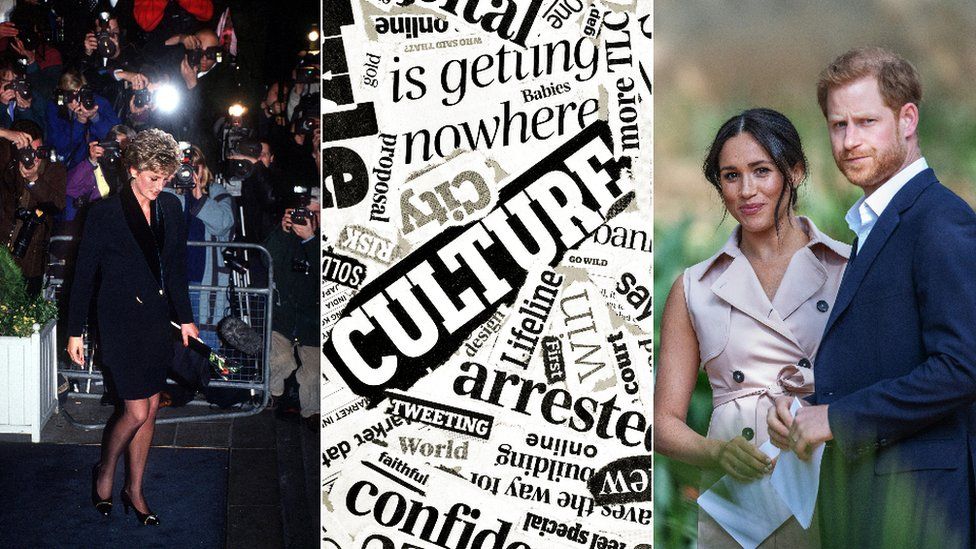
For decades, the motto “never complain, never explain” underpinned British royal life – including its dealings with the press.
But the revelations from the Duke and Duchess of Sussex’s interview with Oprah Winfrey have called into question the state of the British monarchy’s relationship with the media.
Prince Harry spoke of an “invisible contract” between the Royal Family and reporters – a world in which orchestrated public exposure is offered, and a level of scrutiny traditionally accepted, in return for privacy behind palace gates.
Meghan explained: “There’s a reason that these tabloids have holiday parties at the Palace. They’re hosted by the Palace, the tabloids are. You know, there is a construct that’s at play there.”
But that so-called contract could not prevent what Meghan described as a “media frenzy”, which has had a huge impact on the couple’s mental health and played a large role in their decision to step back from royal life last year.
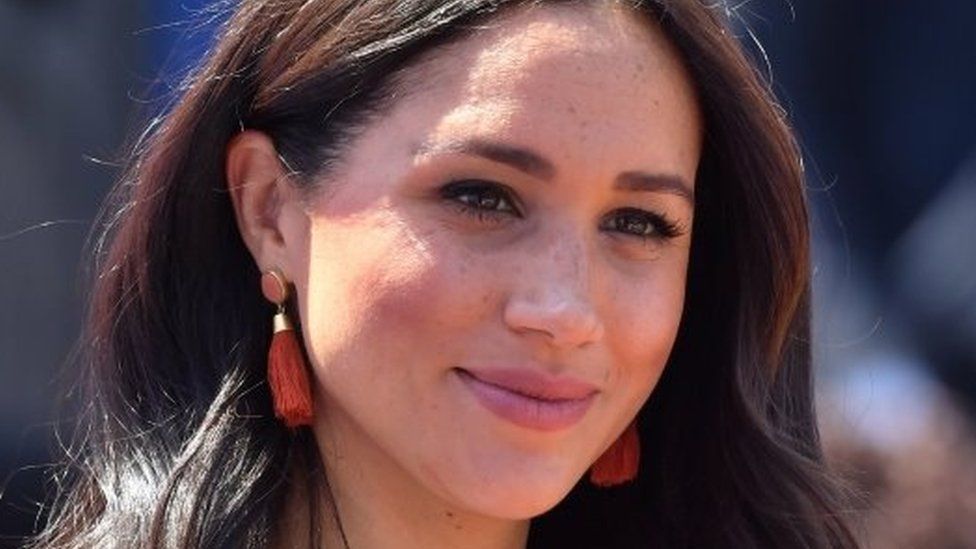
The prince, meanwhile, revealed he “feared history repeating itself” – a reference to his mother Diana, Princess of Wales, who died in a Paris car crash while being hounded by the press.
So, how did this contract originally work – and is it now broken?
Jewel in the crown
The relationship between the monarchy and the media has historically been mutually beneficial, says Dr Laura Clancy, lecturer in media at Lancaster University and author of the forthcoming book Running the Family Firm: How the Monarchy Manages Its Image and Our Money.
For Buckingham Palace, the press has been a tool to communicate with its subjects, while the media has long used monarchy to attract readers and viewers.
In recent decades, royals have had to operate within “the tabloid age and era of royal gossip”, with Meghan the latest to taste life under the media microscope, Dr Clancy says.
“The construction of the royal family, as individual royals with individual stories, means that the monarchy can be consumed by audiences in the age of interest in the lives of public figures,” she explains.
Figures from search engine researchers Rise at Seven showed that 74,000 articles had been published about Meghan worldwide since the duke and duchess confirmed plans to distance themselves from the palace.
On top of this, searches for the duchess jumped 600% after the Oprah interview was announced.
And yet, despite this interest, the British public in general “know little about the inner-workings” between the monarchy and the media, such as the royal rota system which gives “some journalists more intimate access to royal events”, argues Dr Clancy.
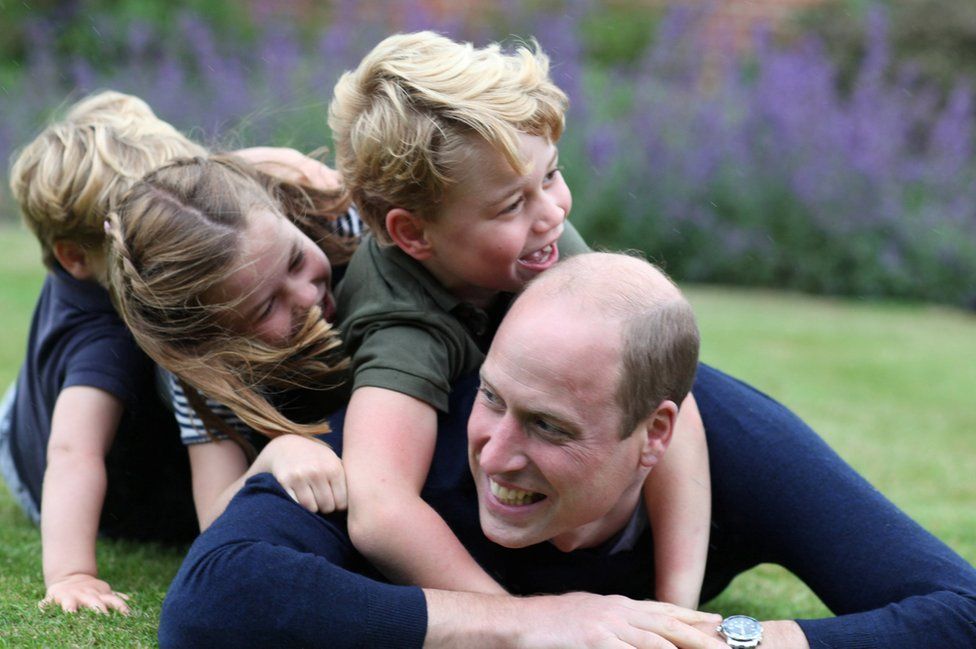
And then there are informal arrangements, such as the so-called “pressure cooker agreement”, where the paparazzi would leave Prince William and Harry alone during their education, “in return for intermittent occasions when they would be invited to staged photograph opportunities” – such as Prince William’s 18th birthday at Eton College.
This continues online in a new form with the prince’s family posts on Instagram, which “appear to give audiences intimate access to royals, but feel carefully staged”, adds Dr Clancy.
Race for clicks
However, the ever-growing dominance of digital news has altered this relationship, as the press scrambles for profitability in a fast-changing media landscape.
“Newspapers are still in the business of selling an audience to advertisers, a readership and page views,” says digital advertising expert Rob Weatherhead. “This hasn’t fundamentally changed with the move to digital publishing, but the metrics and numbers involved have.”
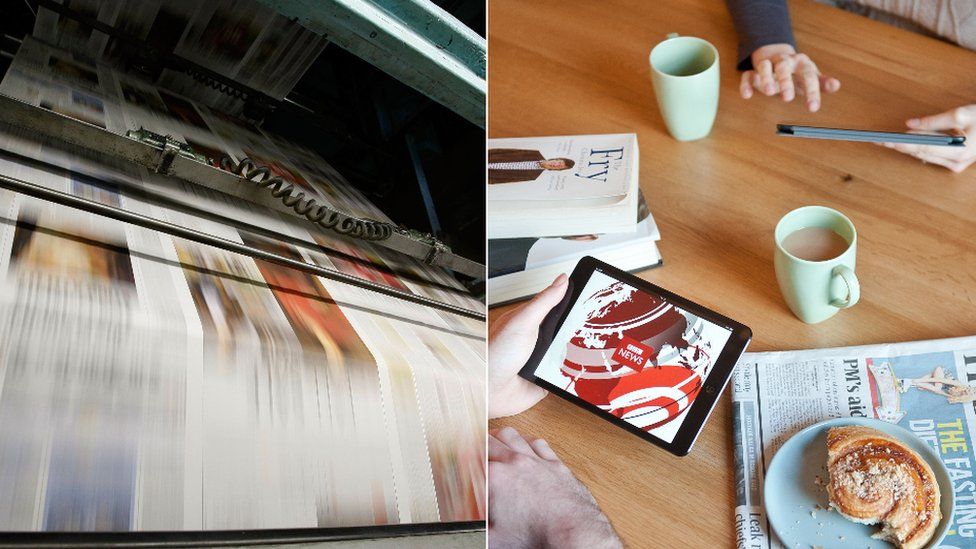
Publishers now “prioritise quantity, often over quality”, he says. And whereas it once used to be a fight for pride of place on the news stand, today publishers compete globally for primacy on search engines.
In the “race to be first” and reach audiences online and through social media, says Weatherhead, index prioritisation and search trends are king (or queen).
This means that enduring public interest in the monarchy make the royals “topics of high interest for publications, regardless of individual views”.
The volume of coverage surrounding Meghan and the Oprah interview has made this especially clear.
During February, when the interview and Meghan’s pregnancy were first announced, there were 6,080 articles written. Since then, interest has skyrocketed.
In the first week of March alone, 25,894 pieces on the duchess went live – an increase of more than 600%. And on Monday evening, as the world reacted to the US broadcast and the airing of the interview in the UK, this jumped to 448 articles in 24 hours, a daily rise of 348%.
Says Weatherhead: “Royalists will want to read about it, anti-royals will want to vent about it, and people in the middle probably have a passing interest just to keep up with the news.
“It has a pretty global appeal. And with that comes high page views and more advertising revenue,” he says.
‘Ruptured balance?’
The destabilisation has directly influenced British royalty’s relationship with the press. No longer is either side able to easily control the narrative and define the relationship.
Prince Harry told Winfrey the UK tabloid media is “bigoted” and creates a “toxic environment” of “control and fear”. But he added: “I’m acutely aware of where my family stand and how acutely scared they are of the tabloids turning on them.”
Meghan added that social media had made the relationship with the press like “the wild, wild West”, and said the royal family’s press operation failed to defend her and her husband from untrue stories.

In response, The Society of Editors said the media was not bigoted, and was holding the “rich and powerful to account”. After criticism, however, it issued a further statement on Wednesday to say its initial comments “did not reflect what we all know: that there is a lot of work to be done in the media to improve diversity and inclusion”.
The duke and duchess’s latest statements add to a growing list of public grievances against certain elements of the press – all of which operate outside the palace’s traditional working relationship with the British media.
Earlier this month, Meghan successfully took the Mail on Sunday newspaper to court over the publication of private letters to her father, and asked for an “account of profits” in respect of her claim for infringement of copyright, which the judge agreed to.
This means that, unlike traditional damages, the paper will have to pay damages based on the revenue they made by publishing the letters – a direct recognition of, and challenge to, the royal family’s worth and relationship to the press.
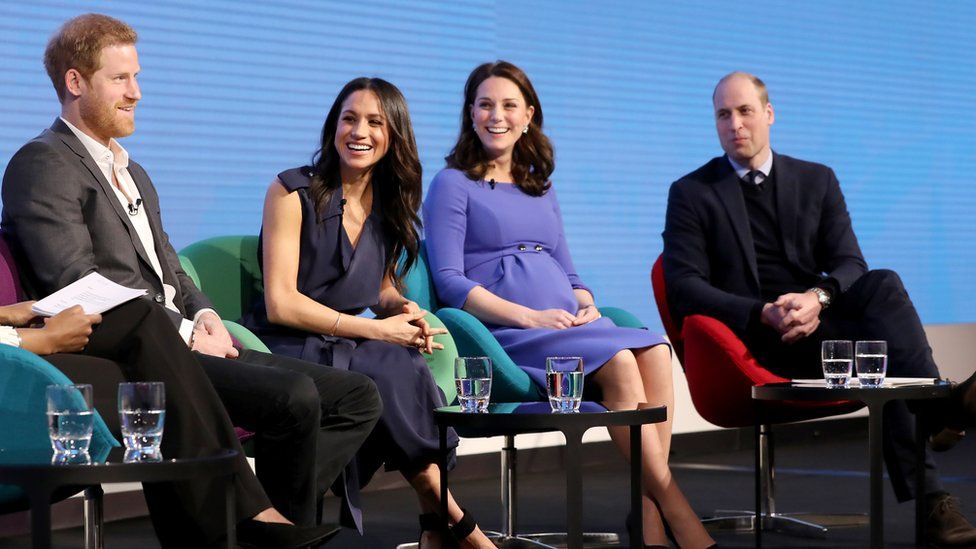
“The monarchy relies on a careful balance of visibility and invisibility to maintain its power, so the inner-workings of monarchy must be kept invisible to protect the institution from scrutiny,” says Dr Clancy.
“Harry and Meghan’s ‘confessional’ interview threatens to rupture this balance.”
Opinion for hire
The royal commentators who offer their opinions for payment are also part of the royal news machine.
Their role was highlighted when YouTube hoaxers Josh Pieters and Archie Manners fooled a number of commentators into giving their views on the Oprah interview two days before it was broadcast.
“News media need sources and columnists to provide coverage,” says Rasmus Kleis, director at the Reuters Institute for the Study of Journalism.
“When no-one – or only very few people actively seeking to control the narrative – has real insight into an issue or topic, there will always be a risk that some publications will settle for anonymous self-interested sources and whoever is willing to provide their insight, or at least express an opinion, as long as it makes for copy.”

Follow us on Facebook, or on Twitter @BBCNewsEnts. If you have a story suggestion email entertainment.news@bbc.co.uk.
Media
Trump could cash out his DJT stock within weeks. Here’s what happens if he sells
Former President Donald Trump is on the brink of a significant financial decision that could have far-reaching implications for both his personal wealth and the future of his fledgling social media company, Trump Media & Technology Group (TMTG). As the lockup period on his shares in TMTG, which owns Truth Social, nears its end, Trump could soon be free to sell his substantial stake in the company. However, the potential payday, which makes up a large portion of his net worth, comes with considerable risks for Trump and his supporters.
Trump’s stake in TMTG comprises nearly 59% of the company, amounting to 114,750,000 shares. As of now, this holding is valued at approximately $2.6 billion. These shares are currently under a lockup agreement, a common feature of initial public offerings (IPOs), designed to prevent company insiders from immediately selling their shares and potentially destabilizing the stock. The lockup, which began after TMTG’s merger with a special purpose acquisition company (SPAC), is set to expire on September 25, though it could end earlier if certain conditions are met.
Should Trump decide to sell his shares after the lockup expires, the market could respond in unpredictable ways. The sale of a substantial number of shares by a major stakeholder like Trump could flood the market, potentially driving down the stock price. Daniel Bradley, a finance professor at the University of South Florida, suggests that the market might react negatively to such a large sale, particularly if there aren’t enough buyers to absorb the supply. This could lead to a sharp decline in the stock’s value, impacting both Trump’s personal wealth and the company’s market standing.
Moreover, Trump’s involvement in Truth Social has been a key driver of investor interest. The platform, marketed as a free speech alternative to mainstream social media, has attracted a loyal user base largely due to Trump’s presence. If Trump were to sell his stake, it might signal a lack of confidence in the company, potentially shaking investor confidence and further depressing the stock price.
Trump’s decision is also influenced by his ongoing legal battles, which have already cost him over $100 million in legal fees. Selling his shares could provide a significant financial boost, helping him cover these mounting expenses. However, this move could also have political ramifications, especially as he continues his bid for the Republican nomination in the 2024 presidential race.
Trump Media’s success is closely tied to Trump’s political fortunes. The company’s stock has shown volatility in response to developments in the presidential race, with Trump’s chances of winning having a direct impact on the stock’s value. If Trump sells his stake, it could be interpreted as a lack of confidence in his own political future, potentially undermining both his campaign and the company’s prospects.
Truth Social, the flagship product of TMTG, has faced challenges in generating traffic and advertising revenue, especially compared to established social media giants like X (formerly Twitter) and Facebook. Despite this, the company’s valuation has remained high, fueled by investor speculation on Trump’s political future. If Trump remains in the race and manages to secure the presidency, the value of his shares could increase. Conversely, any missteps on the campaign trail could have the opposite effect, further destabilizing the stock.
As the lockup period comes to an end, Trump faces a critical decision that could shape the future of both his personal finances and Truth Social. Whether he chooses to hold onto his shares or cash out, the outcome will likely have significant consequences for the company, its investors, and Trump’s political aspirations.

Media
Arizona man accused of social media threats to Trump is arrested

Cochise County, AZ — Law enforcement officials in Arizona have apprehended Ronald Lee Syvrud, a 66-year-old resident of Cochise County, after a manhunt was launched following alleged death threats he made against former President Donald Trump. The threats reportedly surfaced in social media posts over the past two weeks, as Trump visited the US-Mexico border in Cochise County on Thursday.
Syvrud, who hails from Benson, Arizona, located about 50 miles southeast of Tucson, was captured by the Cochise County Sheriff’s Office on Thursday afternoon. The Sheriff’s Office confirmed his arrest, stating, “This subject has been taken into custody without incident.”
In addition to the alleged threats against Trump, Syvrud is wanted for multiple offences, including failure to register as a sex offender. He also faces several warrants in both Wisconsin and Arizona, including charges for driving under the influence and a felony hit-and-run.
The timing of the arrest coincided with Trump’s visit to Cochise County, where he toured the US-Mexico border. During his visit, Trump addressed the ongoing border issues and criticized his political rival, Democratic presidential nominee Kamala Harris, for what he described as lax immigration policies. When asked by reporters about the ongoing manhunt for Syvrud, Trump responded, “No, I have not heard that, but I am not that surprised and the reason is because I want to do things that are very bad for the bad guys.”
This incident marks the latest in a series of threats against political figures during the current election cycle. Just earlier this month, a 66-year-old Virginia man was arrested on suspicion of making death threats against Vice President Kamala Harris and other public officials.
Media
Trump Media & Technology Group Faces Declining Stock Amid Financial Struggles and Increased Competition

Trump Media & Technology Group’s stock has taken a significant hit, dropping more than 11% this week following a disappointing earnings report and the return of former U.S. President Donald Trump to the rival social media platform X, formerly known as Twitter. This decline is part of a broader downward trend for the parent company of Truth Social, with the stock plummeting nearly 43% since mid-July. Despite the sharp decline, some investors remain unfazed, expressing continued optimism for the company’s financial future or standing by their investment as a show of political support for Trump.
One such investor, Todd Schlanger, an interior designer from West Palm Beach, explained his commitment to the stock, stating, “I’m a Republican, so I supported him. When I found out about the stock, I got involved because I support the company and believe in free speech.” Schlanger, who owns around 1,000 shares, is a regular user of Truth Social and is excited about the company’s future, particularly its plans to expand its streaming services. He believes Truth Social has the potential to be as strong as Facebook or X, despite the stock’s recent struggles.
However, Truth Social’s stock performance is deeply tied to Trump’s political influence and the company’s ability to generate sustainable revenue, which has proven challenging. An earnings report released last Friday showed the company lost over $16 million in the three-month period ending in June. Revenue dropped by 30%, down to approximately $836,000 compared to $1.2 million during the same period last year.
In response to the earnings report, Truth Social CEO Devin Nunes emphasized the company’s strong cash position, highlighting $344 million in cash reserves and no debt. He also reiterated the company’s commitment to free speech, stating, “From the beginning, it was our intention to make Truth Social an impenetrable beachhead of free speech, and by taking extraordinary steps to minimize our reliance on Big Tech, that is exactly what we are doing.”
Despite these assurances, investors reacted negatively to the quarterly report, leading to a steep drop in stock price. The situation was further complicated by Trump’s return to X, where he posted for the first time in a year. Trump’s exclusivity agreement with Trump Media & Technology Group mandates that he posts personal content first on Truth Social. However, he is allowed to make politically related posts on other social media platforms, which he did earlier this week, potentially drawing users away from Truth Social.
For investors like Teri Lynn Roberson, who purchased shares near the company’s peak after it went public in March, the decline in stock value has been disheartening. However, Roberson remains unbothered by the poor performance, saying her investment was more about supporting Trump than making money. “I’m way at a loss, but I am OK with that. I am just watching it for fun,” Roberson said, adding that she sees Trump’s return to X as a positive move that could expand his reach beyond Truth Social’s “echo chamber.”
The stock’s performance holds significant financial implications for Trump himself, as he owns a 65% stake in Trump Media & Technology Group. According to Fortune, this stake represents a substantial portion of his net worth, which could be vulnerable if the company continues to struggle financially.
Analysts have described Truth Social as a “meme stock,” similar to companies like GameStop and AMC that saw their stock prices driven by ideological investments rather than business fundamentals. Tyler Richey, an analyst at Sevens Report Research, noted that the stock has ebbed and flowed based on sentiment toward Trump. He pointed out that the recent decline coincided with the rise of U.S. Vice President Kamala Harris as the Democratic presidential nominee, which may have dampened perceptions of Trump’s 2024 election prospects.
Jay Ritter, a finance professor at the University of Florida, offered a grim long-term outlook for Truth Social, suggesting that the stock would likely remain volatile, but with an overall downward trend. “What’s lacking for the true believer in the company story is, ‘OK, where is the business strategy that will be generating revenue?'” Ritter said, highlighting the company’s struggle to produce a sustainable business model.
Still, for some investors, like Michael Rogers, a masonry company owner in North Carolina, their support for Trump Media & Technology Group is unwavering. Rogers, who owns over 10,000 shares, said he invested in the company both as a show of support for Trump and because of his belief in the company’s financial future. Despite concerns about the company’s revenue challenges, Rogers expressed confidence in the business, stating, “I’m in it for the long haul.”
Not all investors are as confident. Mitchell Standley, who made a significant return on his investment earlier this year by capitalizing on the hype surrounding Trump Media’s planned merger with Digital World Acquisition Corporation, has since moved on. “It was basically just a pump and dump,” Standley told ABC News. “I knew that once they merged, all of his supporters were going to dump a bunch of money into it and buy it up.” Now, Standley is staying away from the company, citing the lack of business fundamentals as the reason for his exit.
Truth Social’s future remains uncertain as it continues to struggle with financial losses and faces stiff competition from established social media platforms. While its user base and investor sentiment are bolstered by Trump’s political following, the company’s long-term viability will depend on its ability to create a sustainable revenue stream and maintain relevance in a crowded digital landscape.
As the company seeks to stabilize, the question remains whether its appeal to Trump’s supporters can translate into financial success or whether it will remain a volatile stock driven more by ideology than business fundamentals.
-

 News5 hours ago
News5 hours agoRCMP say 3 dead, suspects at large in targeted attack at home in Lloydminster, Sask.
-

 Sports5 hours ago
Sports5 hours agoLawyer says Chinese doping case handled ‘reasonably’ but calls WADA’s lack of action “curious”
-

 News4 hours ago
News4 hours agoHall of Famer Joe Schmidt, who helped Detroit Lions win 2 NFL titles, dies at 92
-

 News15 hours ago
News15 hours agoCanadanewsmedia news September 12, 2024: Air Canada pilot strike looms, BC transit strike talks resume
-

 News5 hours ago
News5 hours agoNova Scotia adopts bill declaring domestic violence in the province an epidemic
-
News14 hours ago
Local Toronto business story – Events Industry : new national brand, Element Event Solutions
-

 News15 hours ago
News15 hours agoReggie Bush was at his LA-area home when 3 male suspects attempted to break in
-

 News4 hours ago
News4 hours agoB.C. to scrap consumer carbon tax if federal government drops legal requirement: Eby


















